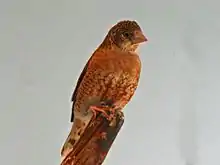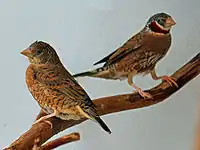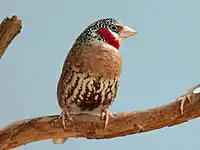Cut-throat finch
The cut-throat finch (Amadina fasciata) is a common species of estrildid finch found throughout Africa; it is also known as the bearded finch, the ribbon finch, the cut throat, and the weaver finch.
| Cut-throat finch | |
|---|---|
.jpg.webp) | |
| Male | |
 | |
| Female | |
| Scientific classification | |
| Kingdom: | Animalia |
| Phylum: | Chordata |
| Class: | Aves |
| Order: | Passeriformes |
| Family: | Estrildidae |
| Genus: | Amadina |
| Species: | A. fasciata |
| Binomial name | |
| Amadina fasciata (Gmelin, 1789) | |
The cut-throat finch has plumage that is pale, sandy brown with flecks of black all over. They have a black-brown tail, a thick white chin and cheeks, and a chestnut brown patch on the belly. The legs are a pink fleshy colour. The adult male has a bright red band across its throat (thus the name "cut throat"), while the male juveniles have a slightly duller red band.
It has an estimated global extent of occurrence of 3,300,000 km². It is found throughout much of Sub-Saharan Africa, particularly in the Sahel, eastern and southern parts of the continent.
Reproduction
Cut-throat finches usually use nests constructed by other birds . A clutch usually consists of 3 to 6 white eggs, which hatch after an incubation period of 12 days.[2]
Origin
Origin and phylogeny has been obtained by Antonio Arnaiz-Villena et al.[3] Estrildinae may have originated in India and dispersed thereafter (towards Africa and Pacific Ocean habitats). Its closest relative is the red-headed finch.
Gallery
 Pair
Pair Male
Male
References
- BirdLife International (2012). "Amadina fasciata". IUCN Red List of Threatened Species. 2012. Retrieved 26 November 2013.CS1 maint: ref=harv (link)
- Mclachlan, G. R.; Liversidge, R. (1978). "821 White-throated Seed-eater". Roberts Birds of South Africa. Illustrated by Lighton, N. C. K.; Newman, K.; Adams, J.; Gronvöld, H (4th ed.). The Trustees of the John Voelcker Bird Book Fund. p. 585.
- Arnaiz-Villena, A; Ruiz-del-Valle V; Gomez-Prieto P; Reguera R; Parga-Lozano C; Serrano-Vela I (2009). "Estrildinae Finches (Aves, Passeriformes) from Africa, South Asia and Australia: a Molecular Phylogeographic Study" (PDF). The Open Ornithology Journal. 2: 29–36. doi:10.2174/1874453200902010029. Archived from the original (PDF) on 2012-03-18.
External links
- Cut-throat finch - Species text in The Atlas of Southern African Birds.
| Wikimedia Commons has media related to Amadina fasciata. |
